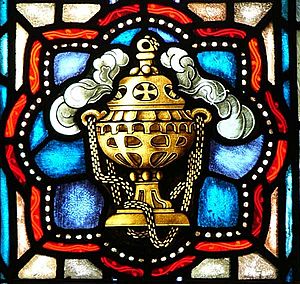Ritualism in the Church of England facts for kids
Ritualism is about how Christians use special actions and ceremonies in their church services. It often focuses on the Holy Communion, which is a very important church meal.
In the Church of England during the 1800s, people had big disagreements about how much ritual should be used. This argument was also part of a bigger fight between two groups: the 'High Church' (who liked more tradition) and the 'Low Church' (who preferred simpler services).
Contents
What is Ritualism?
In the Anglican Church, the word 'ritualist' often describes a group that wanted to bring back many old Catholic ways of worship. These practices included special clothes, incense, and more detailed ceremonies. Some people who follow these practices do not like to be called 'ritualists'.
Why People Argued About Rituals
Arguments about ritualism in the Church of England were often shaped by different ideas about the Bible. People disagreed on how much authority the Bible had and if it was the only guide for Christian life (a belief called sola scriptura).
Reasons to Support Ritualism
People who supported more rituals in the Church of England often believed that using elements from Roman Catholic worship would:
- Show that the Church of England was more like the Catholic Church than the Protestant Church.
- Express the belief that Jesus is truly present in the Eucharist (Holy Communion). They felt the Eucharist should be the most important part of church worship.
- Help people imagine heaven as described in the Book of Revelation. This book talks about white robes and incense in a beautiful setting.
- Connect worship to the story of the Magi in the Gospel of Matthew. The Magi brought gifts of gold, frankincense, and myrrh to baby Jesus as an act of worship.
- Allow worshippers to use all their senses (sight, smell, touch, hearing) to worship God, not just their minds.
- Show the importance of physical things in faith. Christians believe that in Jesus, God "became flesh." Rituals use physical objects and actions to remind people that God cares about the physical world.
- Be a good way to worship for people who learn best by seeing things, or in places where not everyone can read well.
- Be a way for people to offer their very best to God. Worship is about showing how much God is "worth" to them.
Reasons to Oppose Ritualism
People who were against ritualism in the Church of England generally argued that it:
- Could lead to idolatry, meaning people might focus too much on the ritual objects and actions instead of what they represent (God).
- Tried to change the Church of England away from its Protestant identity.
- Made preaching and explaining the Bible less important in church services.
- Encouraged an unhealthy focus on the Eucharist because it was based on the belief that Jesus was truly present in it.
- Used too many fancy things in worship that are not described in the Gospels, Acts of the Apostles, or Epistles in the New Testament. They pointed out that the robes in the Book of Revelation are simply white.
- Goes against a key Protestant belief that human actions, even careful worship, cannot make someone right with God. They believed worship should be a simple, thankful, and joyful response to being saved by faith alone in Jesus. They saw rituals and traditions as human ideas, not God's.
- Often made Christian worship confusing because it used symbols that were hard to understand.
- Was not truly beautiful, as supporters claimed, but rather too flashy and distracting from quiet worship.
See also
- Anglicanism
- Anglo-Catholicism
- The Book of Common Prayer
- Cambridge Camden Society
- Charles Walker (liturgist)
- Christian Social Union
- Church Association
- Richard William Enraght
- T. Pelham Dale
- Percy Dearmer
- James DeKoven
- George Anthony Denison
- Robert William Radclyffe Dolling
- English Missal
- Charles Fuge Lowder
- Alexander Heriot Mackonochie
- English Church Union
- English Hymnal
- Legalism (theology)
- Liturgical Movement
- Gothic Revival
- William Augustus Mühlenberg
- Oxford Movement
- Public Worship Regulation Act 1874
- John Purchas
- John Charles Ryle
- SSC (Society of the Holy Cross)
- Arthur Tooth
- Vestments controversy
- Walsingham
Images for kids
 | Janet Taylor Pickett |
 | Synthia Saint James |
 | Howardena Pindell |
 | Faith Ringgold |



